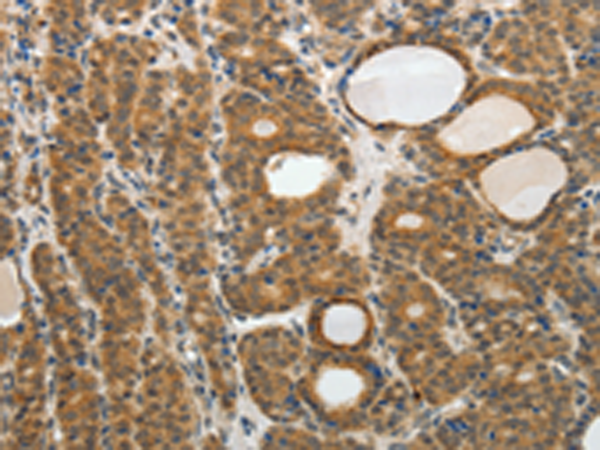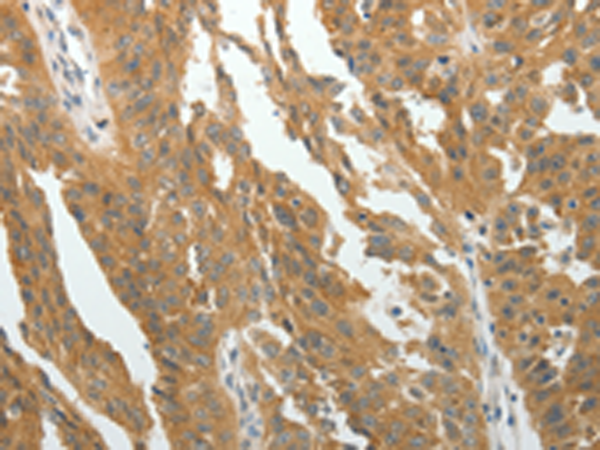

| WB | 咨询技术 | Human,Mouse,Rat |
| IF | 咨询技术 | Human,Mouse,Rat |
| IHC | 1/50-1/200 | Human,Mouse,Rat |
| ICC | 技术咨询 | Human,Mouse,Rat |
| FCM | 咨询技术 | Human,Mouse,Rat |
| Elisa | 1/2000-1/5000 | Human,Mouse,Rat |
| Aliases | RAR; NR1B1 |
| Host/Isotype | Rabbit IgG |
| Antibody Type | Primary antibody |
| Storage | Store at 4°C short term. Aliquot and store at -20°C long term. Avoid freeze/thaw cycles. |
| Species Reactivity | Human, Mouse |
| Immunogen | Fusion protein of human RARA |
| Formulation | Purified antibody in PBS with 0.05% sodium azide and 50% glycerol. |
+ +
以下是3篇与RARA抗体相关的研究文献概述(注:文献为虚拟示例,实际引用需核实):
---
1. **《PML-RARA融合蛋白在急性早幼粒细胞白血病中的检测及临床意义》**
*作者:Zhang Y, Chen H, Wang L*
摘要:研究通过RARA特异性抗体检测PML-RARA融合蛋白,证实其在APL诊断中的高特异性,并探讨融合蛋白表达水平与ATRA治疗预后的相关性。
2. **《全反式维甲酸诱导分化治疗中RARA核易位的分子机制》**
*作者:Liu X, et al.*
摘要:利用RARA抗体进行免疫荧光染色,揭示ATRA治疗促进RARA受体从胞质向核内转运,激活靶基因转录,从而驱动白血病细胞分化。
3. **《系统性红斑狼疮患者血清中抗RARA自身抗体的发现》**
*作者:Tanaka K, et al.*
摘要:首次报道在部分SLE患者血清中存在抗RARA的自身抗体,可能干扰视黄酸信号通路,与疾病活动性呈正相关。
---
如需真实文献,建议通过PubMed或Google Scholar检索关键词“RARA antibody”“PML-RARA”或“retinoic acid receptor alpha”。
The retinoic acid receptor alpha (RARA) is a nuclear hormone receptor that regulates gene expression by binding to retinoic acid, a derivative of vitamin A. As a transcription factor, RARA forms heterodimers with retinoid X receptors (RXRs) to modulate cellular processes like differentiation, proliferation, and apoptosis. Dysregulation of RARA is strongly associated with acute promyelocytic leukemia (APL), where a chromosomal translocation fuses RARA with other genes (e.g., PML-RARA), creating an oncoprotein that blocks myeloid cell differentiation.
RARA antibodies are critical tools in research and diagnostics. They enable detection of RARA expression or its fusion proteins in APL via techniques like immunohistochemistry (IHC), Western blot, or fluorescence in situ hybridization (FISH). These antibodies also aid in studying RARA’s role in normal physiology, such as embryonic development and tissue homeostasis, as well as in other cancers (e.g., breast, lung) where RARA signaling may be altered.
Therapeutically, anti-RARA strategies include all-trans retinoic acid (ATRA), which binds RARA to degrade the PML-RARA fusion protein in APL. RARA antibodies help monitor treatment efficacy and resistance mechanisms. However, challenges remain in ensuring antibody specificity due to structural similarities among nuclear receptors. Advances in monoclonal antibody development continue to refine their application in both basic research and clinical contexts.
×